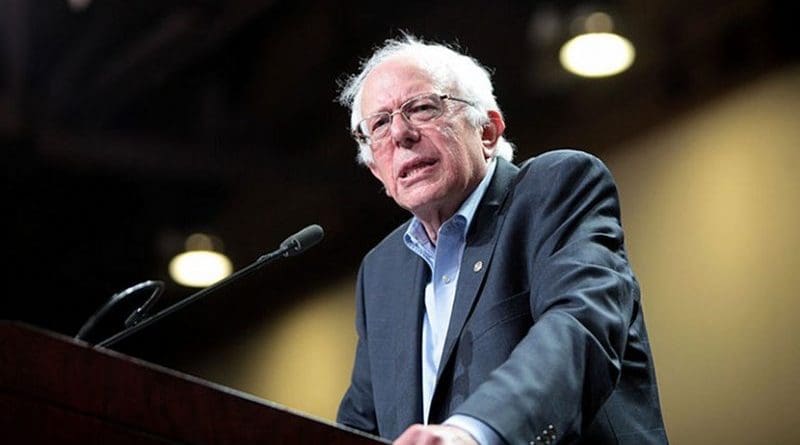Bernie Sanders: ‘Thank God’ For Capitalism – OpEd
By Rev. Ben Johnson*
Senator Bernie Sanders (I-VT) rarely expresses thanks to the divine, much less for the system of global capitalism. When the democratic socialist combines both sentiments, as he did recently, it is worth reporting.
Sanders’ statement takes on greater significance given the context of his interviewer’s question: Bernie Sanders credited capitalism with lifting 1.2 billion people out of extreme poverty.
The moment came during an interview with John Harwood of CNBC. After Harwood asked the Democratic presidential hopeful a series of questions about socialism, he alluded to World Bank data showing that capitalism has moved most of the global poor out of the shadow of death:
Harwood: How do you factor in the significance of the fact that modern, global capitalism has substantially reduced poverty in other parts of the world?
Sanders: When you talk about the global economy, you’re right. Thank God. The terrible, terrible poverty that has been seen in the developing world, some of that is receding. That’s great. On the other hand, you are looking at an unbelievable and grotesque level of global income and wealth inequality. And you’re also seeing, not only massive income and wealth inequality, but in many countries a movement toward increased authoritarianism and away from human rights and democracy. (Emphasis added.)
This elicits a few reflections.
First, Sanders did not quibble with the premise of the question – as he did many of Harwood’s other questions during the interview. In the past, Sanders has hinted that socialism improved, e.g., the Chinese economy. Although he noted that “China is a country that is moving unfortunately in a more authoritarian way,” Sanders said, “in fairness to China” that “its leadership” has “made more progress in addressing extreme poverty than any country in the history of civilization, so they’ve done a lot of things for their people.” The World Bank has observed that “more than 850 million people have lifted themselves out of poverty” in China alone since Beijing adopted a heavily state-regulated (but still freer) form of crony capitalism in place of socialism in 1978. So, Sanders acknowledges that global capitalism has moved a former socialist nation away from mass starvation.
Second, Sanders’ pivot to highlighting “income inequality” perfectly illustrates Margaret Thatcher’s rejoinder to a British MP that socialists care less about human flourishing than grounding everyone down to a common level of misery. She famously quipped: “He would rather that the poor were poorer, provided that the rich were less rich. … So long as the gap is smaller, they would rather have the poor poorer. You do not create wealth and opportunity that way. You do not create a property-owning democracy that way.”
Third, Sanders injected the issue of “wealth inequality,” which is misleading for reasons I detail here.
Fourth, Sanders discussed global income inequality, raising the possibility that he has a more ambitious plan than merely redistributing wealth between U.S. citizens. Nearly one-quarter of all Americans – more than 102 million – rank in the top 10 percent of the richest people in the world, according to the 2018 Global Wealth Report from the Credit Suisse Research Institute.
You only need assets of $4,210 to be above the international average and, hence, eligible to have your income redistributed on a global scale. This bears additional scrutiny.
Finally, Sanders’ off-the-cuff remark proves how firmly the West was founded upon the rock of Judeo-Christian values. Sanders – who describes himself as “not particularly religious” and “not actively involved in organized religion” – knows instinctively that all thanks rightly belong to God. And removing the likelihood of malnutrition and starvation from a billion of His children is certainly cause for thanks.
Let’s not forget the mechanism of the free market, which God used for their deliverance, nor the loving God Who made it possible.
You can watch Sanders’ interview with Harwood below. (The exchange takes place at approximately 7:25.)
*About the author: Rev. Ben Johnson is a senior editor at the Acton Institute. His work focuses on the principles necessary to create a free and virtuous society in the transatlantic sphere (the U.S., Canada, and Europe). He earned his Bachelor of Arts in History summa cum laude from Ohio University and was inducted into Phi Beta Kappa.
Source: This article was published by the Acton Institute

